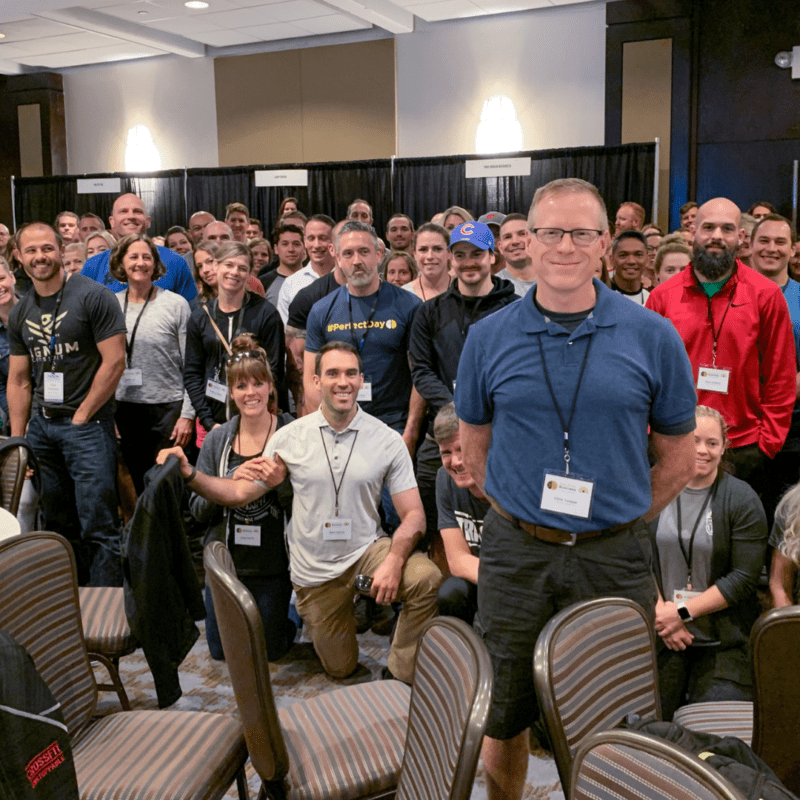I wiped the pink chalk off my knees as my client set up on the barbell.
This was her third attempt at a new deadlift PR. I’d just used her long rest period to explain how ATP worked: a colorful graph in green and pink sidewalk chalk now adorned the rubber matting beside the lifting platform.
She pushed her abs out, filled her lungs with air, descended to the barbell, pulled hard … and dropped it after an inch.
She’d barely stood up before another coach came charging across the room.
“Hey! Why are you giving up so early? Chalk up. We’re going again. Right away! No rest!” he yelled.
She quickly chalked her hands and set up.
“Deep breath. Now pull! Pull! Pull!” he yelled.
Slowly, the bar cleared the floor.
“Don’t stop! Come on! Go! Go! Over the knees!”
Others in the gym started to notice and began to cheer as the barbell inched its way upward.
“Look up! Look up! Finish it!” the coach screamed, jumping up and down beside the lifter.
Her shoulders locked back, the bar finished its climb, and she let out a long howl that echoed through the whole building. She’d done it—she just needed the right message. And a graph about energy metabolism—no matter how colorful—wasn’t the right message. Not with 200 lb. on the line.
The graph and lecture let me feel smart. But the client didn’t need information; she needed a call to action. She needed a reason to succeed. She need a clear step: “Grip hard! Go!” And it took another coach to give her those things at that moment.
“If more information was the answer, then we’d all be billionaires with perfect abs.” —Derek Sivers
The Innovator’s Curse
Inventors don’t make money. Connectors do.
Inventors do the hard part: They come up with new ideas. They create something from scratch. They educate people on why it’s important. They work through refinements until the product is perfect. They advocate, argue and stress over the technical details. And they do it on an empty stomach because no one is looking for them.
Connectors take that product to an audience. Connectors sell it. Connectors make lots of money.
The best connectors are simplifiers.
The innovator focuses on technical features. The connector says, “I can solve your problems.”
Innovators want to show people how smart they are. Connectors want people to win.
Innovators are often trapped in a never-ending cycle of product development, audit and refinement. They say things like “I’m a product person” (guilty!) and wonder why people don’t see the obvious benefits of their ideas.
Simpler, not Dumber
I just had a call with one of the founders of an original scoring platform for CrossFit. These guys launched in 2008—years before anyone else. They have a crazy data set. Their software never breaks. It’s half as expensive as their biggest competitor. But their competitor has 10 times as many clients. Why? Because the founder is an innovator, not a connector. He’s super smart. His business has a great “culture.” But his clients keep leaving for simpler platforms.
The smartest usually get the ball rolling. But they don’t usually win.
In fact, innovators might be too smart. Because the voices in their heads speak the same language, they believe everyone does, too. But we don’t. We want simple. We buy simple. We reward people who make things simpler.
“Simpler” doesn’t mean dumb. It takes a particular kind of genius to simplify. Great editors make great books. Even Einstein said, “You don’t understand physics until you can explain it to a 10-year-old.”
“Constantly varied functional movement performed at high intensity” is a genius concept that gets great fitness results. It simplifies the puzzle of fitness. But you know what simplifies it more?
“Watch your heart rate on this big scoreboard!”
The average Orangetheory franchise owner knows less about fitness than the average CrossFit owner. Most are less fit. Few ever think about “the programming.” They also net around seven times as much per year.
Not because of their advertising or their brand. Because of their simplicity.
Simplicity Wins
Good ideas win the hearts and minds of the few people already paying attention. Simple ideas spread.
How do you know when your idea is simple enough to spread?
- When your mom can describe your service to a stranger.
- When the stranger can describe it back to you.
- When your tagline fully describes your product.
- When you don’t need 140 characters to share your mission.
- When you can explain it to a 10-year-old.
The key to simplifying your service is practice. Keep cutting your description down through iteration. Interview yourself. Explain it in 20 words, and then do it in 15. Ask your best clients to describe your service and copy what they say. Cut complication, then cut more.
It’s not enough to have a good idea. Innovators go hungry. You have to bring your service, your product, your Big Idea, your art to an audience that wants to receive it. That’s what business is. Invention isn’t business. Connection is business. A transaction is just a connection involving money. And relationships are just multiple connections over time.
Stop trying to prove how smart you are and start making money on your idea.

